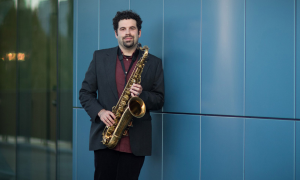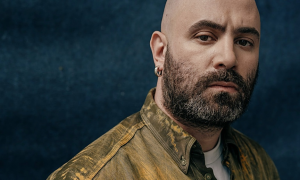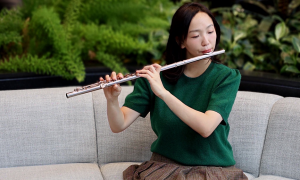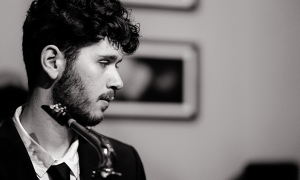Home » Jazz Articles » Take Five With... » Take Five with Denin Koch
Take Five with Denin Koch

Meet Denin Koch
Hailed as possessing "pristine playing, meticulous composing" and "a very personal voice deserving of attention," guitarist and composer Denin Koch has synthesized his wide and varied influences into a unique approach to jazz improvisation. He has performed with Arturo Sandoval, Pat Metheny, Branford Marsalis, Ellis Marsalis, Wycliffe Gordon, Dee Daniels, Ryan Keberle, and the Spokane Symphony (as a soloist), published a book, graduated from the Eastman School of Music, and released an album of original music—all before his 25h birthday. Koch has honed his craft under the tutelage of many of the greatest musicians and educators in the world, including Kurt Rosenwinkel, Gary Versace, Bob Sneider, Dave Rivello, and Bill Dobbins. His playing has been called "full of variety," "nimble," and possessing of "inherent modernism" and a "subtle touch."re: manhattan project, Koch's debut album, is a ten-movement suite for jazz quintet that reimagines the story of the Manhattan Project. It received a four-star rating on All About Jazz and has been praised as "remarkable," "extraordinary, "moving" and containing "beautiful interplay."
Instruments:
Guitar, although I played tuba for twelve years as a kid! You'd be surprised how often the lessons I learned playing tuba serve me on the fretboard.Teachers and/or influences?
I've been fortunate to study with some of the heaviest cats on the scene today, including Kurt Rosenwinkel, Gary Versace, Bob Sneider, Dave Rivello, Bill Dobbins, Steve Kovalcheck, Dan Keberle, and Brent Edstrom. As far as influences go, I am a huge Pat Metheny fan, and I've also spent a lot of time checking out Miles, Wayne, Trane, Monk, Benny Golson, Lee Morgan, Radiohead, Alexander Scriabin, Dmitri Shostakovich, Charlie Parker, Joe Pass, Kenny Garrett, Herbie Hancock, Brad Mehldau, Led Zeppelin, Duke Ellington, Wes Montgomery, Jim Hall.... I suppose I'd better stop there before I use up all my characters!I knew I wanted to be a musician when...
I played in an African marimba ensemble at my elementary school when I was a little kid, probably nine or ten. We had this incredible teacher who got us to play these African and original tunes with all these insane rhythmic patterns (5 against 7, 4 against 5, non-symmetrical phrases, etc.) without ever showing us a page of sheet music (I think it worked because we never understood that what we were doing is supposed to be hard— to this day, I have no idea how he got us to play that stuff). One year, we were invited to play at the National Music Educator's Association Conference, and during our performance his huge crowd of young music teachers formed to watch us play and they started freaking out at how hip it sounded (again, we had no idea just how remarkable what we were doing was). Excited by how much these people were enjoying our music, the band locked in with the most amazing energy and time, and I felt something inside me click into place, and I knew right then and there that I couldn't do anything but that for the rest of my life. It was one of the most fulfilling and happiest moments of my life—I still revisit that memory often.Your sound and approach to music.
I'm chasing the kind of sound that cats like Trane, Kurt Rosenwinkel, Wes Montgomery, McCoy Tyner, Herbie Hancock, Wayne Shorter, Thelonious Monk, Maria Schneider and Emily Remler have—a tone as big as a house, compositions that create worlds within themselves, and a spiritual core on the brink of eruption. At the end of the day, I strive to do everything with honesty and purity—as Pat Metheny says, "doing and playing what I absolutely have to play or I'll just die."Your teaching approach
I want my students to fall in love with music the way I have, and to be excited about the idea of picking up their axe. I believe it is absolutely crucial to learn from and study masters that become models, and then to expand upon what we learn from them. I look at master musicians as being a completed puzzle that we take apart and put back together over and over again. Once you've done that, you steal a few pieces from their puzzle and go on to the next master "puzzle" to rinse and repeat. Once you've done that many times, you realize that all the pieces you've gathered fit together into a new puzzle that reveals YOU. So, all that to say, my goa with my students is to teach them technique and tradition, and then to teach them how to study their favorite players and set them on the journey of putting their puzzle together.Your dream band
I am always grateful to be making music with the people I happen to be making music with at the time. That said, I would love to play quintet with Larry Grenadier, Sullivan Fortner, Brian Blade and Melissa Aldana. Those cats are all SO killing and I know they would push me to new creative heights. (If any of you happen to read this... hit me up!)Favorite venue
I've gotten to play a lot of amazing clubs and venues, but honestly, there's something special about the Emerald of Siam in Richland, WA. It's a small Thai restaurant and bar that has a huge variety of music from all over the place, and I happen to be good friends with the owners. I grew up playing there and I play a gig there every December when I'm home for Christmas. It's always packed and I get to see so many old friends who have helped me along my journey. It's no Small's or Dazzle, but its home and I always look forward to playing there.Your favorite recording in your discography and why?
I only have one right now, but I am VERY proud of re: manhattan project. As I said earlier, my goal as a musician is to be as pure and honest with my music as I possibly can, and that recording represents exactly how I felt about the subject, the world and myself at the time of its writing and recording. To me, that record is exciting and engaging, but also deeply emotional, and if I can achieve that with my upcoming and distant future projects, I will die happy. Plus, my fiancée helped me market it and get it ready to go, and those memories of her helping me just because she could tell how important it was to me are really precious to me.What do you think is the most important thing you are contributing musically?
I think that I bring an honesty, energy and heart to my music that is totally unique to me. There are many, many, many musicians who know more about harmony, rhythm, melody, composition, guitar playing, and improvisation than me, but I will admit that I haven't found anyone who makes me feel the way that I feel when I listen to my own music (and not just from a place of familiarity or pride). I see my music as autobiographical in a very deep way—even when I'm writing about nuclear weapons, or space, or my fiancée, or even other musicians, I sense that I can reflect my feelings in the music very clearly—and that goes beyond the page, too, and I've been so very fortunate to play with musicians who will buy in to what I'm going for.Did you know...
I'm a huge Seattle Seahawks fan! I grew up watching them with my dad and stuck with them through all the 6-10, 4-12 years. The Russell Wilson / Pete Carroll era has made all those terrible years worth it. The first jazz album I bought was:
First Circle by Pat Metheny! I remember hearing the title track for the first time and being so mind-blown that music could sound like that. I call those "What was THAT?" moments, where you encounter some new music that totally knocks you out and makes the world look different. The Atomic Mr. Basie, Star of Jupiter (Kurt Rosenwinkel), Soul Station (Hank Mobley), Jim Hall Live!, The Poll Winners (Barney Kessel), Solo Monk, Maiden Voyage (Herbie Hancock), Giant Steps (Trane) and a bunch of other records have also been that kind of thing for me.Music you are listening to now:
Bud Powell: The Amazing Bud Powell (Blue Note)Scriabin: Préludes (as performed by Racha Arodaky) (Zig-Zag Territories)
Wayne Shorter: Adam's Apple (Blue Note)
Elmo Hope Trio: Elmo Hope Trio (HiFi Jazz)
Emily Remler: Firefly (Concord)
Desert Island picks:
Kurt Rosenwinkel: Star of Jupiter (Wom Music)Pat Metheny Group: (Still Life) Talking (Geffen)
Wes Montgomery: Smokin' at the Half Note (Blue Note)
Radiohead: A Moon-Shaped Pool (XL Recordings)
Oscar Peterson Trio and Clark Terry: Oscar Peterson Trio Plus One (Verve)
How would you describe the state of jazz today?
There are more people now making more incredible music than we've ever had in the history of the music, and I think that my generation has realized the need for a change in the way we are compensated for our art. I'm not sure what that looks like yet, but I am optimistic about the future and the way things are now. There are too many of us with music in our hearts that will kill us if we don't let it out, so I don't think that "jazz" is going anywhere anytime soon. To me, the best musicians are the ones who have taken some puzzle pieces from the earlier masters like Louis, Bird, Monk, Prez, and Hawk, some from the "classic" era like Art Blakey, Miles, Trane, Horace Silver, and Wayne Shorter, and some from what's going on today, especially Melissa Aldana, Maria Schneider, Lage Lund, Stefon Harris, Christian McBride, Kurt Rosenwinkel, Peter Bernstein, Joel Frahm, Ambrose Akinmusire, etc. If you've spent enough time in the shed to have a little of all those people in your playing, you're going to sound like you AND have that deep connection to the "tradition" we all talk about.What are some of the essential requirements to keep jazz alive and growing?
I think that we musicians need to make it as clear as we can that our music is for EVERYONE. I think that we suffer from the same false image of elitism that classical music does. Very few of the musicians that I know feel like their music is above anyone or anything else, and we need to communicate that to our audiences. When we let people think that jazz is "complex," "difficult," or "highbrow," we lose our audiences before we even reach them.What is in the near future?
I've got some gigs (can't believe I'm writing that!) at the major clubs here in Denver, am working on booking for post-COVID, and I'm writing the music for my wedding in March as well as a bunch of new compositions that have various themes. All those new tunes will probably turn into a record or two within the next few years. I'm also working on turning re: manhattan project into a set of big band pieces.What is your greatest fear when you perform?
That someone in the audience will come with the expectation that I will try my hardest to make them feel something and leave disappointed. What could be worse than that?What song would you like played at your funeral?
"The fields the river the sky" from my record re: manhattan project.What is your favorite song to whistle or sing in the shower?
"De Dah" by Elmo Hope. Name a catchier tune with hipper changes—I'll bet you can't!By Day:
I'm working on my doctorate at the University of Northern Colorado and teaching in my home studio.If I weren't a jazz musician, I would be an:
Astrophysicist. I love learning about space, stars, planets, physics, chemistry, and all that kind of stuff. I think it is really fascinating and can teach us a lot about music, too. I love theoretical physics—vacuum decay, black holes, wormholes, things like that!If I could have dinner with anyone from history, who would it be and why?
This is tough, but I would probably have to go with Gustav Mahler. He had such an amazing, tragic, beautiful life and experienced so much in his time on Earth. As a musician, he is my model for writing programmatic music. His vision and emotion are so clear in his music -it has a certain inevitability that you won't find anywhere else. He is the grandmaster of creating worlds with his music—each of his symphonies, Kindertotenlieder, Das Lied von de Erde, and the Piano Quintet, to me, are individual planets or worlds that you can visit when you listen. I'd like to ask him how he did that.Your favorite quote:
"Why not us?" —Russell WilsonTags
Take Five With...
Denin Koch
AAJ Staff
arturo sandoval
pat metheny
Branford Marsalis
Ellis Marsalis
Wycliffe Gordon
Dee Daniels
Ryan Keberle
Kurt Rosenwinkel
Gary Versace
Bob Sneider
Dave Rivello
Bill Dobbins
benny golson
lee morgan
Charlie Parker
Joe Pass
Kenny Garrett
Herbie Hancock
brad mehldau
duke ellington
Wes Montgomery
Jim Hall
McCoy Tyner
Wayne Shorter
Thelonious Monk
Maria Schneider
Emily Remler
Larry Grenadier
Sullivan Fortner
Brian Blade
Melissa Aldana
Emerald of Siam
Bud Powell
Elmo Hope
oscar peterson
Clark Terry
Art Blakey
Horace Silver
Lage Lund
Stefon Harris
Christian McBride
Peter Bernstein
Joel Frahm
ambrose akinmusire
PREVIOUS / NEXT
Support All About Jazz
 All About Jazz has been a pillar of jazz since 1995, championing it as an art form and, more importantly, supporting the musicians who make it. Our enduring commitment has made "AAJ" one of the most culturally important websites of its kind, read by hundreds of thousands of fans, musicians and industry figures every month.
All About Jazz has been a pillar of jazz since 1995, championing it as an art form and, more importantly, supporting the musicians who make it. Our enduring commitment has made "AAJ" one of the most culturally important websites of its kind, read by hundreds of thousands of fans, musicians and industry figures every month.
























